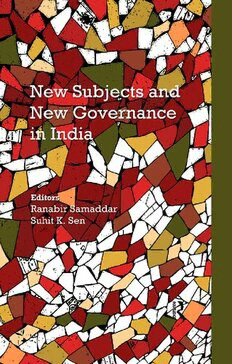
New Subjects and New Governance in India PDF
Preview New Subjects and New Governance in India
New Subjects and New Governance in India This page intentionally left blank New Subjects and New Governance in India Editors Ranabir Samaddar Suhit K. Sen LONDON NEW YORK NEW DELHI First published 2012 in India by Routledge 912 Tolstoy House, 15–17 Tolstoy Marg, Connaught Place, New Delhi 110 001 Simultaneously published in the UK by Routledge 2 Park Square, Milton Park, Abingdon, OX14 4RN Routledge is an imprint of the Taylor & Francis Group, an informa business © 2012 Mahanirban Calcutta Research Group Typeset by Star Compugraphics Private Limited 5, CSC, Near City Apartments Vasundhara Enclave Delhi 110 096 All rights reserved. No part of this book may be reproduced or utilised in any form or by any electronic, mechanical or other means, now known or hereafter invented, including photocopying and recording, or in any information storage and retrieval system without permission in writing from the publishers. British Library Cataloguing-in-Publication Data A catalogue record of this book is available from the British Library ISBN: 978-0-415-52290-8 Contents List of Tables and Figures vii Acknowledgements ix Introduction 1 Ranabir Samaddar and Suhit K. Sen Section I: A Second Transition? Sources of Legitimacy and ‘Scientifi c’ Governance 1. The Democratic Story of Twin Challenges to Governance: Identity Needs and Developmental Needs 13 Amit Prakash 2. New Technique of Governance: E-Governance and India’s Democratic Experience 69 Dipankar Sinha 3. Disasters: Experiences of Development during the Embankment Years in Bihar 109 Manish K. Jha 4. Between Ecology and Economy: Environmental Governance in India 154 Sutirtha Bedajna 5. Confl ict and Development: Implications for Democracy and Governance 211 Sujata Dutta Hazarika Section II: The Production of Appropriate Subjects 6. The Cultured Subjects 247 Badri Narayan Tiwari vi (cid:151) New Subjects and New Governance in India 7. A Well-behaved Minority Population 269 Ranabir Samaddar 8. The Educated Subjects 329 Anup Dhar Bibliography 376 About the Editors 394 Notes on Contributors 395 Index 396 List of Tables and Figures Tables 1.1 Performance of Political Parties in Constituencies of Jharkhand in the Lok Sabha Elections, 1991 48 1.2 Performance of Jharkhandi Political Parties in the Lok Sabha Elections, 1991 50 1.3 Performance of Political Parties in Constituencies of Jharkhand in the Lok Sabha Elections, 1996 51 1.4 Performance of Jharkhandi Political Parties in the Lok Sabha Elections, 1996 53 1.5 Performance of Political Parties in Constituencies of Jharkhand in the Lok Sabha Elections, 1998 54 1.6 Performance of Jharkhandi Political Parties in the Lok Sabha Elections,1998 56 1.7 Performance of Political Parties in Constituencies of Jharkhand in the Lok Sabha Elections, 1999 57 1.8 Performance of Jharkhandi Political Parties in the Lok Sabha Elections, 1999 59 1.9 Performance of Political Parties in Constituencies of Jharkhand in the Lok Sabha Elections, 2004 61 1.10 Performance of Jharkhandi Political Parties in the Lok Sabha Elections, 2004 63 1.11 Performance of Political Parties in Constituencies of Jharkhand in the Lok Sabha Elections, 2009 65 1.12 Performance of Jharkhandi Political Parties in the Lok Sabha Elections, 2004 67 8.1 Ratio of Private and Public Share in Higher Education Sub-sectors 348 Figures 2.1 Focal Domains for e-Governance 83 4.1 Irreversibility of Environmental Process and the Asymmetry of Technological Change 162 viii (cid:151) New Subjects and New Governance in India 4.2 Environmental Kuznet’s Curve 164 4.3 Trade-offs between Inter-generational Effi ciency and Equity 166 4.4 Organisational Structure of the MoEF, India (Environment Wing) 186 4.5 Organisational Structure of the MoEF, India (Environment Wing) 188 8.1 The Education Conundrum 338 Acknowledgements With two companion volumes on the present history of gov- ernance in India, Political Transition and Development Imperatives in India and New Subjects and New Governance in India, the Calcutta Research Group (CRG) com-pletes almost a decade-long study of some of the specifi c features of post-colonial demo- cracy, particularly in India. In the course of these years we have picked up the themes of autonomy, justice, and governance. Our work began with an investigation into the role and function of autonomy in Indian democracy. This was followed by research on popular perceptions of social justice, law and its limits in delivering justice, and the ways in which marginalities have produced demands for justice. Now, in the two volumes, we shift our focus to the specifi cs of post-colonial governance, the de- velopmental paradigm of governance, and its interface with popular claims, rights, and justice. Autonomy, justice, and governance — these are three of the fundamental areas of democratic theory and research, which we felt have been neglected in traditional historico-political studies of democracy. In this sense, these are different from the usual studies of civil society, political society, elections, parliament, bureaucracy, and social capacity for democratic function that crowd the fi eld of democratic studies. They are also different from studies of indi- vidualism, liberty, freedom, etc. But hopefully, together these volumes will throw new light on some of the less discussed aspects of Indian democracy. These researches were carried all through in dialogic manner. A large number of people — scholars and non-scholars — participated in workshops, dialogues, and meetings held in different parts of the country. Several institutions collaborated with CRG. Besides the dialogues and workshops, the research drew inspiration from the wide-ranging discussions in the Third and Fourth Critical Studies Conference (Kolkata, 2009, 2011) held respectively on the themes of ‘Empires States, and Migration’ and ‘Logistics, Development, and Democracy’, and the symposium on ‘Bio-politics, Development, and Governance’ (Kolkata, 2010).
